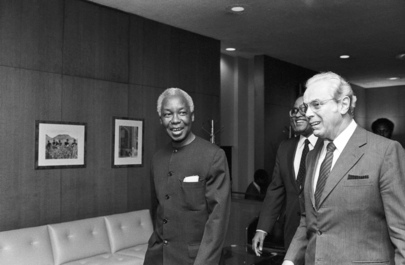
Remembering the legacy of one of Africa’s most charismatic and iconic post-colonial statesmen
THE LAST WORD | Andrew M. Mwenda | Last week, I travelled to Tanzania to commemorate Nyerere Day. The event was held in Butiama, a small village in Northern Tanzania where Julius Nyerere was born. It marked 25 years since his death. Nyerere was the founding president of Tanganyika, later to merge with Zanzibar to form Tanzania. He is the most revered of Africa’s founding fathers and statesmen. I was hosted by Edward Nyerere, his grandson, a young and charismatic lad with whom I spent all my time in Tanzania moving from Dar Es Salam to Mwanza and to Butiama.
Why is Nyerere loved, admired and respected in Tanzania, Africa and across the rest of the world? He didn’t build a prosperous economy as Lee Kuan Yew did in Singapore or Park Chang Hee did in South Korea. On the country, his economic performance was the worst in Africa, worse than Mobutu Sese Seko’s Zaire. Between 1961 when Tanzania got independence and 1985 when he retired, Tanzania’s GDP shrunk by over 40% against a growing population. This catastrophic economic decline was a result of Nyerere’s policies. And as Sabastian Edwards has written is his book, Toxic Aid: The Collapse and Recovery of Tanzania, this was despite massive inflows of foreign aid to the country. In fact, under Nyerere Tanzania received the highest foreign aid per capita of any country in Africa.
Even politically, Nyerere did not run a democracy where citizens were free to challenge him and his government. On the contrary he ran a tight one-party state where dissent was proscribed. Consequently, there was no multi-party electoral competition, no free press or free assembly or free association. His opponents were driven into exile. He ruled for 24 years until he retired in 1985. Yet Nyerere’s has not been relegated to the garbage heap of other “African despots”. Instead, tens of thousands of people had travelled from far and wide to Butiama to honor him. More than 3,000 Ugandans came by bus and plane to honor him. There were also delegations from Mozambique, Zimbabwe, DRC, Kenya and South Africa.
As I have said Nyerere was not a great economic transformer like Lee Kuan Yew or Park Chang Hee. He was not a great general like Yoweri Museveni or Paul Kagame who built an army from a small band and grew it into a formidable fighting machine that overthrew an incumbent government within four years and turn it into a pan African institution able to project power in other countries, enforcing peace. And he was not a towering intellectual statesman of the quality of Kwame Nkrumah who inspired the whole of Africa to raise against colonialism and dream of continental unity.
So, what made Nyerere a historical figure that is loved, admired and respected across Tanzania, Africa and the world? I think it was the integrity of his character and the moral fiber of his being. I think what has inspired many people to admire Nyerere is that he was honest and earnest. He was dedicated to making Tanzanians better and expressed his motives in word and deed. Thus, even when and where he failed, Tanzanians (and others) were able to see that he was working for the good of Tanzania. He could be high handed in handling his opponents or misguided in his economic policies. But he did not do it for personal gain or aggrandizement. He did it in the honest belief that he was doing the best for Tanzania.
Therefore, what Nyerere teaches all of us is that greatness does not necessarily have to come from great economic transformation or huge military conquest or inspiring intellectual exhortations even though these also form a part of greatness. A leader can also be great by exhibiting dedication to public service, exercise power with humility, treat others with curtesy and have a moral campus. A good leader does not have to be a democrat to be great. The most important factor to greatness is dedication to the welfare of the citizens. Whether the leader fails or succeeds in this ambition is often secondary. What is most important are his motives.
I met Nyerere thrice in my life. The first time I was 15 years when he visited Fort Portal with Museveni, and I gave a speech on behalf of the youths. He gave me a very warm hug for it. The second time was in Dar Es Salem when I was 23. I spent eleven straight hours with him at his home in Musasani discussing politics in Africa. It was a dream come true. Looking back, I cannot understand how a person of his historic significance could give a university student such time. The last time I visited him was in hospital in London and I could not talk to him. It was a painful experience to watch this lion of a man lying dying in hospital bed away from his country. These encounters and the things I have read and heard about him left in me a lasting impression of this giant of African politics.
Nyerere had a humility only matched by two other former presidents in Africa that I have met and interacted with at some lengths – Kenneth Kaunda of Zambia and Yokub Gowan of Nigeria. Reading about him or watching videos of him, one can see he possessed an unparalleled array of political skills and emotional strains that helped him win the hearts and minds of many. He could empathize with people and listen to other people’s points of view even when he did not agree. This is most exhibited in his complicated relationship with Museveni, who was hostile to Nyerere’s close friend, Obote. Without going into details, in his decisions regarding how to balance this complicated equation, he acted with skill to repair injured feelings that might have escalated into permanent hostilities.
After presiding over catastrophic economic decline, Nyerere decided to retire voluntarily from power. He was not the first president in Africa to do this. The honor had gone at Gen Afrifa in Ghana in 1969, Leopold Sedar Senghor in Senegal in 1980, Ahmed Ahidjo in Cameroon in 1982 and Siaka Stevens in Sierra Leone in 1985. But what was different about Nyerere is that in his retirement speech, he took responsibility for the failure of his policies and even of the actions of his subordinates and acknowledged his errors as president. Tanzania was bankrupt and it could only be rescued if it accepted policy prescriptions from the IMF and World Bank. Yet Nyerere was not willing to sacrifice his principles at the altar of expedience. He said he was leaving so that he can let others find another path.
Tanzania’s economic collapse was greatly exacerbated by the invasion of Uganda to remove Idi Amin. This was an act of altruism unparalleled in the world. There was no economic or geostrategic advantage for Nyerere and Tanzania to remove Idi Amin from power. Nyerere was largely driven by his humanist convictions that a murderous regime must be removed from power so that the people of Uganda can be free. He was also motivated by his unbending loyalty to his friend, Milton Obote who was living in exile in Tanzania. I do not know of any such act of selflessness.
But most importantly, Nyerere ensured a united Tanzania with a shared language and national identity. I do not agree that this was his personal creation. By 1961, over 90% of Tanzanians spoke Swahili. So, it was only inevitable that it became a national language. Besides, Tanzania did not have deep seated ethnic divisions that we find in other post-colonial African countries like Uganda, Ghana, Nigeria, Kenya, DRC, etc., and Nyerere was always the first person to admit. For instance, in the 1961 elections leading to independence, his party, TANU, won all the seats in parliament, the opposition ANC getting zero. The other candidate elected outside TANU was a disgruntled member who had lost in party primaries and run as an independent. Hence, Tanganyika enjoyed unusual unity before independence.
What Nyerere did was to sustain the sense of national unity and a shared language and build upon both, backed by a strong centralizing political party, CCM. What made him great was therefore his sincerity, the moral purity of his vision and actions and his inclination to admit his errors. These qualities made Tanzanians forgive him, love, admire and respect him even though he presided over catastrophic economic decline.
*****

amwenda@ugindependent.co.ug
 The Independent Uganda: You get the Truth we Pay the Price
The Independent Uganda: You get the Truth we Pay the Price




Nyerere spent a lot of money to liberate most countries in south of Tanzania from Malawi all the way to South Africa. He was a pan Africanist in a true sense of it, just like Nkurumah. Nyerere never invaded an African country on behalf of the west or did their bidding like Museveni in DRC in 1998. Museveni uses Ugandan army to mercenary work. More that 90% of what Museveni was driven by accruing benefits to his family, his regime survival and to very large extent less about Ugandans